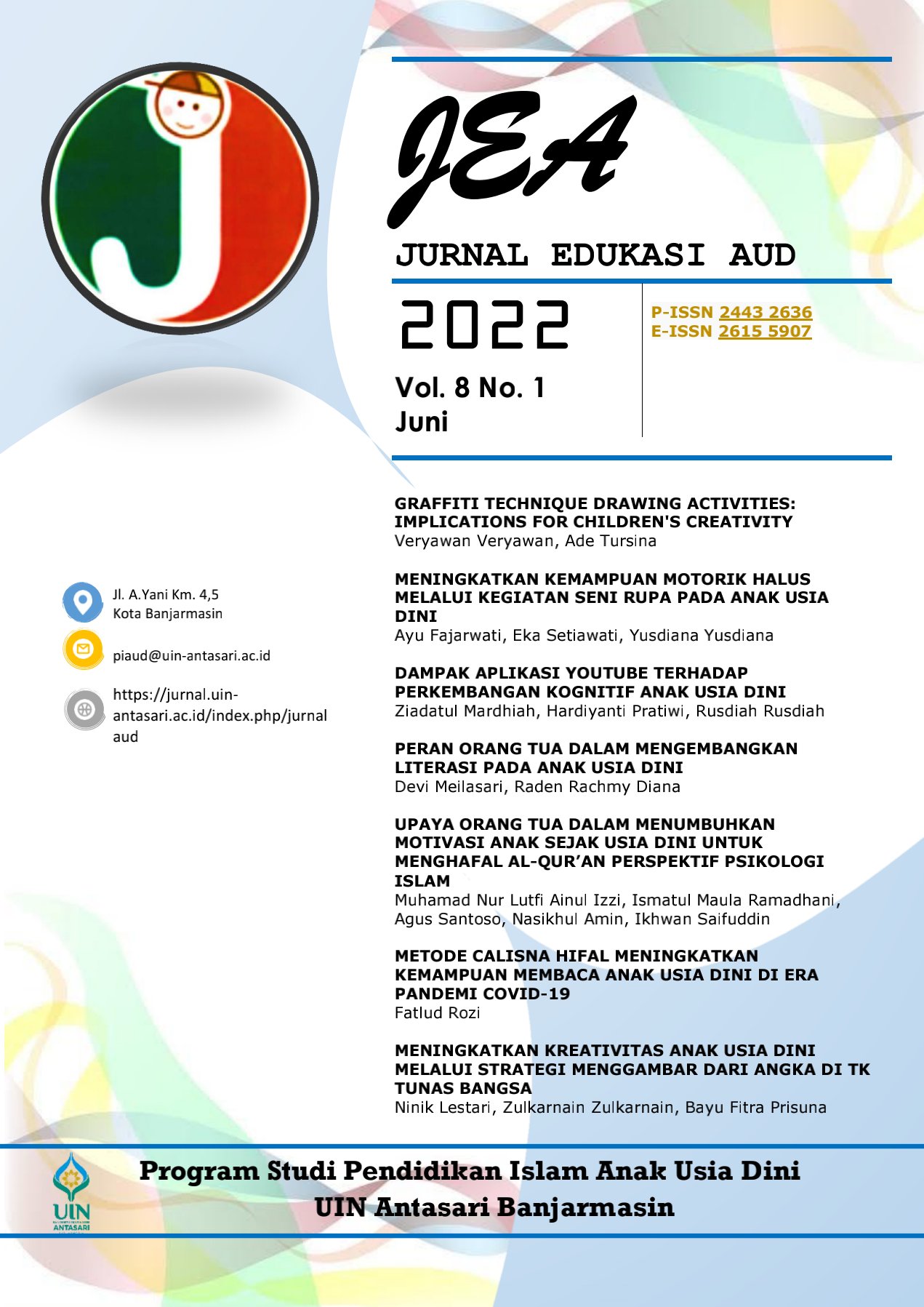METODE CALISNA HIFAL MENINGKATKAN KEMAMPUAN MEMBACA ANAK USIA DINI DI ERA PANDEMI COVID-19
DOI:
https://doi.org/10.18592/jea.v8i1.6962Keywords:
Pendidikan, anak usia dini, membaca anak usia diniAbstract
Children are successors on earth, every child born has various abilities. The impact of the Covid-19 pandemic has resulted in parents not optimally assisting their children in learning, especially learning to read. Reading is an important component thatmust be developed for early childhood. The need for an effective method to trigger talent, interest in early childhood development in reading and understanding their environment. For this reason, the calisna hifal method creates a leraning pattern that is interactive, active and collaborative. This study uses a descriptive qualitative research method by examining 30 children aged 0-8 years for 10 months and the results of the analysis conclude that the calisna hifal method can effectively improve early childhood reading skills in the Covid-19 pandemic era.References
Abu, A. (2017). Psikologi Umum. Rineka Cipta.
Ancok, D., & Fuad, N, S. (2011). Psikologi Islami: Solusi Islam atas Problem-Problem Psikologi. Pustaka Pelajar Yogyakarta.
Artini, L. E. J., Magta, M., Ujianti, P. R., (2019). Pengaruh metode membaca dasar bermediakan big book terhadap kemampuan membaca permulaan anak kelompok A. Jurnal Pendidikan Anak Usia Dini Undiksha, 7 (2), 192-202. https://doi.org/10.23887/paud.v7i2.18994
Ashtuti, Fuji. (2019). Implementasi Senam Pinguin dalam Mengembangkan Keterampilan Motorik Kasar Anak Usia Dini Kelompok B di RA Uswatun Hasanah Martapura. JEA (Jurnal Edukasi AUD), 5 (1), 1-13. http://dx.doi.org/10.18592/jea.v5i1.3060
Azizah, A., Delfi Eliza. (2021). Pelaksanaan Metode Bermain Peran dalam Mengembangkan Kemampuan Membaca dan Menulis pada Anak. Jurnal Basicedu, 5 (2), 717-723. https://doi.org/10.31004/basicedu.v5i2.798
Barbara, A., & Wasik. (2008). Pendidikan Anak Usia Dini. Macanan Jaya Cemerlang.
BKKBN. (2015). Menjadi Orang tua Hebat. Direktorat Bina Keluarga dan Anak Badan Kependudukan Keluarga Berencana Nasional
Dewi, Y. A. S. (2019). Peningkatan Perkembangan Bahasa Anak Usia Dini Melalui Metode Membaca Pada Permainan Kartu Kata. SELING: Jurnal Program Studi PGRA, 5(2), 208-216. https://doi.org/10.29062/seling.v5i2.452
Djaali. (2017). Psikologi Pendidikan. Bumi Aksara.
Fitri, U. (2020). Penggunaan Metode Cantol Roudhoh Dalam Meningkatkan Kemampuan Membaca Anak Usia Dini Kelompok A Di RA Muslimat NU 013 Islamiyah II Sedah. Wisdom: Jurnal Pendidikan Anak Usia Dini, 1 (2), 193-206. https://doi.org/10.21154/wisdom.v1i2.2374
Kementerian Pendidikan dan Kebudayaan. (2015). Peraturan Menteri Pendidikan dan Kebudayaan Republik Indonesia Nomor 146 Tahun 2014 Tentang Kurikulum 2013 Pendidikan Anak Usia Dini.
Muhibbin, S. (2017). Psikologi Belajar. Rajawali Press.
Muhyidin, A., Rusidin, O., Salpariansi, E. (2018). Metode pembelajaran membaca dan menulis permulaan di kelas awal. Jurnal Pendidikan Dasar, 4 (1), 30-42. http://dx.doi.org/10.30870/jpsd.v4i1.2464.g2357
Nahdi, K. & Yunitasari, D. (2020). Literasi Berbahasa Indonesia Prasekolah: Ancangan Metode Dia Tampan Dalam Membaca Permulaan. Jurnal Obsesi, 4 (1), 446-453. http://dx.doi.org/10.31004/obsesi.v4i1.372
Nana, S., & Ibrahim. (2012). Penelitian dan Penilaian Pendidikan. Sinar Baru Algesindo.
Ngalim, P. (2017). Psikologi Pendidikan. PT Remaja Rosdakarya.
Shihab, Quraish. (2014). Anakku Pelihara Rantai Emas Itu. Lentera Hati.
Sugiyono. (2013). Metode Penelitian Pendidikan. CV Alfabeta.
Syamsu, Y. (2012). Psikologi Perkembangan Anak dan Remaja. Remaja Rosdakarya.
Tadzkiroatun, M. (2008). Memilih, Menyusun Menyajikan Cerita Untuk Anak Usia Dini. Tiara Wacana.
Umar, S. & Miftachul, C. (2019). Metode Penelitian Kualitatif di Bidang Pendidikan. CV Nata Karya.
Downloads
Published
How to Cite
Issue
Section
License
Authors who publish with this journal agree to the following terms:
- Authors retain copyright and grant the journal right of first publication with the work simultaneously licensed under a Creative Commons Attribution License that allows others to share the work with an acknowledgement of the work's authorship and initial publication in this journal.
- Authors are able to enter into separate, additional contractual arrangements for the non-exclusive distribution of the journal's published version of the work (e.g., post it to an institutional repository or publish it in a book), with an acknowledgement of its initial publication in this journal.
- Authors are permitted and encouraged to post their work online (e.g., in institutional repositories or on their website) prior to and during the submission process, as it can lead to productive exchanges, as well as earlier and greater citation of published work.

JEA (Jurnal Edukasi AUD) by http://jurnal.uin-antasari.ac.id/index.php/jurnalaud/index is licensed under a Creative Commons Attribution 4.0 International License.










